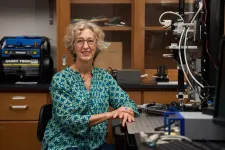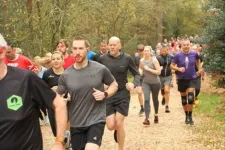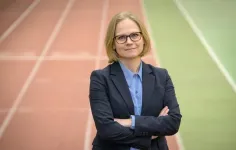(Press-News.org) Utilizing the potential of quantum computers and achieving a real advantage for practical applications — this goal is being pursued worldwide. In Baden-Württemberg, the Competence Center Quantum Computing Baden-Württemberg (KQCBW) has dedicated itself to this goal over the past four years. Great progress has been made in various areas of quantum computing in successful joint projects. The success of the KQCBW is now to be continued and the unique quantum computing ecosystem in the state further expanded.
The KQCBW will be continued in a ten-month transfer project “Competence Center Quantum Computing Baden-Württemberg: Transfer Project (KQCBW24),” which was launched in September 2024. The transfer project will continue the research work started in the previous projects and carry out important preliminary work for follow-up projects, which are scheduled to run for three years. The KQCBW is funded by the Baden-Württemberg Ministry of Economic Affairs, Labor and Tourism.
Broad expertise: hardware/software co-design
The KQCBW pursues an interdisciplinary and systemic approach that includes the development of alternative hardware platforms as well as targeted and application-oriented hardware/software co-design. The expertise that has been built up over the last four years in Baden-Württemberg within the KQCBW will be further expanded in the coming years. The research topics range from quantum simulation in materials and natural sciences to requirements for powerful and reliable hardware environments and the programming of quantum algorithms for industrial needs.
No quantum computing without quantum computers
In order to conduct application-oriented research into quantum computing, real quantum computers are indispensable. A key element in the Competence Center Quantum Computing Baden-Württemberg (KQCBW) is therefore access to a powerful state-of-the-art quantum computing infrastructure. To this end, the Fraunhofer-Gesellschaft is continuing its role as a quantum innovation center within the IBM Quantum Network and with IBM Deutschland GmbH, within the framework of the KQCBW. With a renewed agreement, the KQCBW will have access to the latest quantum computers from IBM installed in Ehningen, as well as IBM’s fleet of utility-scale quantum systems available over the cloud.
In addition to access to the IBM systems, access to an NV-based quantum computer and the provision of the HPC simulation infrastructure as well as the virtual demonstrator platform for the simulation of quantum algorithms will also be made possible for all project partners within the KQCBW. This forms a comprehensive quantum computing infrastructure that offers the KQCBW partners ideal conditions for their research work.
Results from the KQCBW at Quantum Effects 2024
Outstanding results were achieved in five joint projects in the previous phase of the KQCBW. In the field of quantum computer hardware design based on nitrogen color centers (NV) in diamonds, system efficiency and quality were significantly increased by means of dipolar NV-NV coupling and the development of robust two-qubit gates and dynamic decoupling protocols. In addition, more accurate simulations of complex molecules were achieved using variational quantum algorithms. In another project, it was possible to develop better tailored methods for characterizing and correcting the errors occurring on the hardware of the superconducting IBM quantum computer. Another research group developed end-to-end demonstrators based on eight use cases from the fields of production, logistics, engineering and automotive and provided self-explanatory, interactive Jupyter notebooks for the entire quantum software development process.
These research results and others from the KQCBW will be presented by the partners at this year’s Quantum Effects, the world’s leading exhibition and conference for application-oriented quantum technologies in Stuttgart, on October 8 and 9, 2024. The software and hardware demonstrators will be presented at the joint QuantumBW booth (booth number 2D15) and the researchers will give talks on their project results and present the next steps in the KQCBW on the QuantumBW exhibition stage on September 9.
About KQCBW
Under the management of the Fraunhofer Institutes for Applied Solid State Physics IAF and for Industrial Engineering IAO, other Fraunhofer Institutes and research partners from politics, science and industry are pooling their expertise in the development and application of quantum computers for research, education and industry in the Quantum Computing Competence Centre Baden-Württemberg. The focus is on the information technology, medical technology, chemicals, finance, mechanical engineering, production, automotive and logistics sectors, which are particularly important in Baden-Württemberg. The KQCBW is also actively involved in the development of Baden-Württemberg as a quantum technology location as part of the office of the state initiative QuantumBW.
The transfer project KQCBW2024 paves the way for the continuation of the KQCBW from July 2025. It involves 12 partners from university and non-university institutes as well as five associated corporate partners: The Fraunhofer Institutes for Applied Solid State Physics IAF, for Industrial Engineering IAO, for Manufacturing Engineering and Automation IPA, for Mechanics of Materials IWM and for Chemical Technology ICT; the DLR Institutes for Engineering Thermodynamics and for Quantum Technologies; the University of Stuttgart, the University of Ulm, the University of Constance, the Eberhard Karls University of Tübingen, the Karlsruhe Institute of Technology KIT, the Research Center for Information Technology FZI, EnBW Energie Baden-Württemberg AG, HQS Quantum Simulations GmbH, Kipu Quantum GmbH, Robert Bosch GmbH and Classiq.
Further information:
Learn more about the Competence Center Quantum Computing Baden-Württemberg
Find more information about the “Competence Center Quantum Computing Baden-Württemberg: Transfer Project (KQCBW24)”
END
Pioneering quantum computer research continues in Baden-Württemberg
Competence Center Quantum Computing Baden-Württemberg: KQCBW2024 transfer project launched
2024-10-01
ELSE PRESS RELEASES FROM THIS DATE:
Discovery of orbital angular momentum monopoles enables orbital electronics with chiral materials
2024-10-01
In traditional electronics, information is transferred using the charge of electrons. However, future technologies may rely on a different property of electrons—their intrinsic angular momentum. Historically, the focus has been on electron spin, a form of build-in angular momentum that creates a magnetic moment, as the leading candidate for next-generation devices. Now, researchers are exploring the potential of orbitronics, a field that utilizes the angular momentum of electrons generated as they orbit the atomic nucleus. Orbitronics holds great promise ...
New mouse models offer valuable window into COVID-19 infection
2024-10-01
LA JOLLA, CA—Scientists at La Jolla Institute for Immunology (LJI) have developed six lines of humanized mice that can serve as valuable models for studying human cases of COVID-19.
According to their new study in eBioMedicine, these mouse models are important for COVID-19 research because their cells were engineered to include two important human molecules that are involved in SARS-CoV-2 infection of human cells—and these humanized mice were generated on two different immunologic backgrounds. ...
Antibodies in breast milk provide protection against common GI virus
2024-10-01
A study led by researchers at the University of Rochester Medical Center found that breast milk provides protection against rotavirus, a common gastrointestinal disease that causes diarrhea, vomiting and fever in infants. Babies whose mothers had high levels of specific antibodies in their breast milk were able to fend off the infection for a longer period than infants whose mothers had lower levels. The findings are expected to drive future research to improve infant health through optimized breastfeeding practices.
Published in the Journal of Clinical Investigation and funded by the Bill and Melinda Gates Foundation, the study also ...
University of Cincinnati professor named MacArthur fellow
2024-10-01
When the phone rang on a September afternoon, University of Cincinnati's Shailaja Paik, PhD, tired from a full day of meetings and teaching, did not expect to hear news that would leave her “ears numb.”
“I had been named a (MacArthur) fellow, and I wasn’t sure I was hearing correctly, but I tried to keep my cool,” she remembers, chuckling. “I thought, ‘Is this right? I’m going to ask her to repeat herself.’
“I was ecstatic.”
The MacArthur Fellows Program, also ...
Research provides new insights into role of mechanical forces in gene expression
2024-10-01
The genome inside each of our cells is modelled by tension and torsion — due in part to the activity of proteins that compact, loop, wrap and untwist DNA — but scientists know little about how those forces affect the transcription of genes.
“There are a lot of mechanical forces at play all the time that we never consider, we have very little knowledge of, and they’re not talked about in textbooks,” said Laura Finzi, the Dr. Waenard L. Miller, Jr. ’69 and Sheila M. Miller Endowed Chair in Medical Biophysics at Clemson University.
Transcription is the process by which a cell makes an RNA copy of a segment of DNA. One ...
HSE scientists have developed a new model of electric double layer
2024-10-01
This new model accounts for a wide range of ion-electrode interactions and predicts a device's ability to store electric charge. The model's theoretical predictions align with the experimental results. Data on the behaviour of the electric double layer (EDL) can aid in the development of more efficient supercapacitors for portable electronics and electric vehicles. The study has been published in ChemPhysChem.
Many devices store energy for future use, with batteries being among the most well-known examples. They can consistently release energy, maintaining steady power output regardless of existing conditions or load, until fully ...
UK ParkRun participants report improved life satisfaction six months later
2024-10-01
UK ParkRun participants report improved life satisfaction six months later, with most benefit for the least active people, and an estimated value between £16.70 and £98.50 for every £1 of running costs.
####
Article URL: https://journals.plos.org/globalpublichealth/article?id=10.1371/journal.pgph.0003580
Article Title: The impact of parkrun on life satisfaction and its cost-effectiveness: A six-month study of parkrunners in the United Kingdom
Author Countries: United Kingdom
Funding: This study was funded by Sheffield Hallam University (SJH and AB) and by The University of Sheffield (HQ). The funders had no role in study design, data collection and analysis, ...
‘Who’s a good boy?’ Humans use dog-specific voices for better canine comprehension
2024-10-01
The voice people use to address their dogs isn’t just because of their big puppy eyes. Humans slow their own speech when talking to their dogs, and this slower tempo matches their pets’ receptive abilities, allowing the dogs to better understand their commands, according to a study published October 1st in the open-access journal PLOS Biology by Eloïse Déaux of the University of Geneva in Switzerland and colleagues.
Dogs respond to human speech, even though they themselves cannot produce human sounds. To better understand how people ...
A third of Swedish cheerleaders tell of psychological abuse
2024-10-01
Of current and former cheerleading athletes in Sweden, 29% reported being subjected to psychological abuse in the sport, according to a new study from Linköping University, Sweden. The study shows that dissatisfaction with leadership, injuries, high expectations and bad atmosphere in the team are major reasons why athletes give up the sport.
“It’s similar to what we see in other sports: that it’s primarily psychological abuse that stands out,” says Carolina Lundqvist, docent in psychology and sports science and licensed psychotherapist at the Department of Behavioural Sciences at Linköping ...
Authoritarian populism has weakened democracy in Brazil - study
2024-10-01
The rise of authoritarian populism in Brazil weakened structures that stabilise democracy – mirroring trends in wider global society and potentially making it harder for the country to strengthen its democracy in future, a new study reveals.
The experiences of Brazilians in recent years under the administration of former President Jair Bolsonaro highlight the weakening of welfare systems and human rights protections critical in maintaining democratic stability.
This, in turn, contributed to the rise of militarism ...
LAST 30 PRESS RELEASES:
New study from Jeonbuk National University finds current climate pledges may miss Paris targets
Theoretical principles of band structure manipulation in strongly correlated insulators with spin and charge perturbations
A CNIC study shows that the heart can be protected during chemotherapy without reducing antitumor efficacy
Mayo Clinic study finds single dose of non-prescribed Adderall raises blood pressure and heart rate in healthy young adults
Engineered immune cells show promise against brain metastases in preclinical study
Improved EV battery technology will outmatch degradation from climate change
AI cancer tools risk “shortcut learning” rather than detecting true biology
Painless skin patch offers new way to monitor immune health
Children with poor oral health more often develop cardiovascular disease as adults
GLP-1 drugs associated with reduced need for emergency care for migraine
New knowledge on heritability paves the way for better treatment of people with chronic inflammatory bowel disease
Under the Lens: Microbiologists Nicola Holden and Gil Domingue weigh in on the raw milk debate
Science reveals why you can’t resist a snack – even when you’re full
Kidney cancer study finds belzutifan plus pembrolizumab post-surgery helps patients at high risk for relapse stay cancer-free longer
Alkali cation effects in electrochemical carbon dioxide reduction
Test platforms for charging wireless cars now fit on a bench
$3 million NIH grant funds national study of Medicare Advantage’s benefit expansion into social supports
Amplified Sciences achieves CAP accreditation for cutting-edge diagnostic lab
Fred Hutch announces 12 recipients of the annual Harold M. Weintraub Graduate Student Award
Native forest litter helps rebuild soil life in post-mining landscapes
Mountain soils in arid regions may emit more greenhouse gas as climate shifts, new study finds
Pairing biochar with other soil amendments could unlock stronger gains in soil health
Why do we get a skip in our step when we’re happy? Thank dopamine
UC Irvine scientists uncover cellular mechanism behind muscle repair
Platform to map living brain noninvasively takes next big step
Stress-testing the Cascadia Subduction Zone reveals variability that could impact how earthquakes spread
We may be underestimating the true carbon cost of northern wildfires
Blood test predicts which bladder cancer patients may safely skip surgery
Kennesaw State's Vijay Anand honored as National Academy of Inventors Senior Member
Recovery from whaling reveals the role of age in Humpback reproduction
[Press-News.org] Pioneering quantum computer research continues in Baden-WürttembergCompetence Center Quantum Computing Baden-Württemberg: KQCBW2024 transfer project launched





